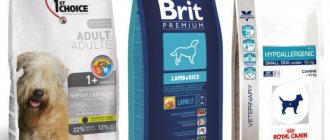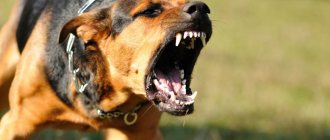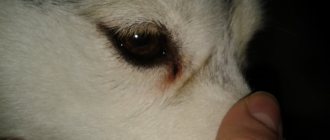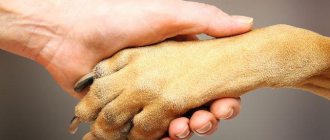What causes an unpleasant odor
The manifestation of foul breath is not always limited to improper hygiene. Even the most attentive and caring owner's dog can suffer from this phenomenon. The terrible smell of ammonia, rotten fish or acetone immediately raises fears that the pet is unhealthy.
Advertising:
There are many ailments that rarely show their symptoms. Why you need to immediately determine the root cause of why your dog’s breath stinks and carry out the correct course of therapy.
The smell of "dog"
Very often, after a walk, going into a closed room, a pug (like most other dog breeds) smells very strongly and unpleasantly. The appearance of such an odor is associated with the activity of the pet, it sweats, gets wet in the rain, and the fur absorbs various odors well. To prevent this from happening, you need daily care for your pug’s coat and bathe your pet as often as possible.
The fur should be brushed in one direction using a stainless steel wire brush.
The breath of a young puppy and a young dog smell disgusting
This unwanted pathology can affect not only adult pets, but also small dogs.
The factors are:
- Replacement of teeth. Small dogs (Spitz, Pekingese, Yorkie, Chihuahua, dwarf dachshund) have milk teeth that are difficult to loosen and do not fall out without the help of others. Tightly seated teeth violate the integrity of the gums, thus causing inflammatory processes. All this provokes a disgusting putrid smell from the mouth of the four-legged pet.
- Foreign bodies. A small puppy often plays and may not control himself during play, gnawing sticks or other objects into small pieces. The residue settles between the incisors, causing swollen gums and a bad odor.
- Leftover food. Food stuck in teeth will sooner or later decompose. If it is not removed and cleaned in time, the pet will also develop a rotten smell from its mouth.
How to get rid
Only after considering the factors that can cause halitosis in a dog and identifying the cause that caused it, is appropriate treatment prescribed for the pet.
If you have plaque, it is advisable to decide on the correct feeding and introduce solid foods (carrots, apples, small bones) into the diet. This allows you to clean the oral cavity of soft formations, growths, plaque and food debris. A method that has worked well is adding tomato juice or softened tomatoes to food. After just two weeks, the softened plaque can be removed with a regular cotton swab. If it is not possible to remove tartar at home, it is removed with ultrasound in a veterinary clinic. If the enamel is damaged, the teeth are covered with a special gel or filled.
To restore the disturbed microflora, a course of medications such as Bifidumbacterin or Bifitrilak is recommended. If worms are present, treatment with anthelmintics is indicated.
The simplest preventative measures will help you avoid a putrid odor:
Brushing your teeth (at least once a week) with antibacterial paste.
Introduction of solid foods into the diet.
Regular examination of teeth and mouth, cleaning of plaque at home or in the clinic.
Using special treats with rawhide and enzymes that help soften plaque on teeth.
Use of rubber chewing toys.
And, of course, it is necessary to remove sweet, floury, and fatty foods from the diet, which often cause “smell” from the animal’s mouth.
Diseases of the kidneys and genitourinary system (in old dogs over the age of 10 years). At the same time, the dog’s mouth (especially saliva) smells strongly of urine.
A mature dog smells bad
The reasons that cause bad breath in a mature dog are already more extensive.
What signals pathologies:
- Tartar.
Factor of the dental kind, which is a repeated reason for the manifestation of a nasty stench from the dog’s mouth. Many dog breeders ignore this sign, mistakenly believing that plaque does not pose any threat to the animal. But damaged tooth enamel can become a hotbed for the development of infections, which will ultimately adversely affect the health of your four-legged pet.
- Neoplasms of benign and malignant nature.
Small tumors in a dog’s mouth not only cause discomfort to the pet, but also cause a terrible stench.
- Urinary tract diseases.
Often the smell of urine or ammonia from a dog's mouth can indicate chronic renal failure. The animal's metabolism slows down, which contributes to the abundant release of ammonia.
- Autoimmune imbalance.
The pungent smell of acetone can be an important indicator that a dog has diabetes. By closely observing the dog, it is quite possible to make a diagnosis yourself. Diabetes mellitus causes extreme thirst, and your four-legged friend drinks a lot of fluids. In this case, you need to take a blood test for sugar and listen to the veterinarian’s recommendations on further actions.
- Liver diseases.
A foul odor from your pet’s mouth, similar to rotten meat, will indicate an unsatisfactory condition of the liver. In this case, you need to immediately take the dog for examination to a specialist.
- Worms.
The presence of dangerous companions, for example, tapeworms or roundworms, quite often causes a nasty odor from the mouth. It is not easy to determine the presence of parasitic organisms in a pet’s body on your own. With such questions, it is better to contact an experienced specialist and use his recommendations to drive away unwanted guests.
- Digestive problems.
Disorders of the stomach often provoke an unpleasant odor from the mouth. Therefore, if you smell rotten smell from your pet, this may indicate poor intestinal patency.
- Respiratory tract diseases.
If there is infection in the upper part of the respiratory tract, then it is quite possible that a nasty odor may appear from the dog’s mouth. Along with this, your pet may experience a slight cough and fever.
Why does a dog's mouth smell like fish?
The reasons may be the following:
- The dog simply ate the fish. This is a product, especially in its raw form, that retains its smell for a long time. In this case, the animal cannot brush its teeth on its own. It is clear that the “aroma” can last even for several days.
- Based on the first point, regularly treat your pet’s mouth and teeth. With certain jaw deformations, food gets stuck in the teeth, and as a result, a bad odor develops over time.
- If the stench from the mouth is strong and incessant, and the animal has not eaten raw fish, then we may be talking about blockages of the anal glands. Odor-forming bacteria grow in the mouth and esophagus.
- Metabolic disorders under certain circumstances also cause odor from the mouth.
In this case, it is important to understand that points 3 and 4 indicate a serious illness in the dog, so under no circumstances should you postpone a visit to the veterinary clinic. You value your pet and don’t want him to get sick, experience discomfort and even pain?
External factors that provoke a nasty odor
There are other mediators that cause dog mouth stink. Fortunately, they are easy to correct.
What applies to external provocateurs:
- Eating protein treats. When deli meats are metabolized, a nitrogenous product is released, which causes a rotten smell. This phenomenon can be avoided if you reduce the amount of meat and other foods rich in protein in your diet.
- Food settling in the buccal space. Pieces of food stuck behind the cheeks can fester over time and create a rotten smell.
- Change of drink. If you stop giving your pet spring water and switch to chlorinated water, this can cause dysbiosis in the animal. The disease gives rise to the spread of an unpleasant odor.
- Unbalanced pet diet. To keep your pet's breath fresh, you need to switch to natural nutrition and higher quality food.
The above problems are not so serious and can be easily eliminated.
Elderly dogs.
Dogs that live to an old age can suffer from the same diseases as middle-aged dogs. In this age group of dogs, in addition to tartar and neoplasms in the oral cavity, bad breath can be one of the symptoms of serious diseases of the internal organs. Veterinary specialists include such diseases as:
*Kidney diseases (nephrosclerosis), in which the dog will smell of ammonia from the mouth. Diseases of the gastrointestinal tract, liver - giving an unpleasant smell of rotting meat or a sweetish tart smell. Various disruptions in the endocrine system (diabetes mellitus in animals, diabetes insipidus in animals) - the smell of acetone or rotting apples.
How to remove odor from a dog's mouth?
You can detect the factor causing the unpleasant odor from a dog’s mouth by yourself by carefully examining your pet. First, it is worth examining the oral cavity for the presence of excess food between the teeth.
If you cannot understand why your dog’s breath smells like rotten meat, then you need to contact a specialist. He will tell you how to treat the pathology.
An experienced specialist will conduct a series of examinations to accurately understand the pet’s condition, and then prescribe therapy.
If the problem is limited only to the presence of tartar, then it can be easily eliminated by brushing your teeth. In the case of more serious problems, surgical intervention cannot be avoided.
Unpleasant mouth odor in puppies and young dogs
Traditionally, people are more concerned about the health of puppies. In the case of bad breath in puppies and adolescents, the diagnosis is a little easier since there are not many possible causes.
Almost all small dog breeds have some difficulty changing their baby teeth. An inexperienced owner may not know that a molar can grow behind the baby tooth, causing the baby tooth to begin to rot, resulting in a distinct and very unpleasant odor. The situation is complicated by damage and infection of the gums. Further, in a fairly short time, the healthy microflora in the mouth changes to an unfriendly, putrefactive one, which significantly enhances the smell. This mechanism works with absolutely all living beings. For example, in a person, even one diseased tooth can spoil the freshness of breath despite twice-daily brushing and the use of antibacterial mouth rinse.
Traditional methods for eliminating unpleasant odors
If, after examination by a veterinarian, no dangerous pathologies are identified, but the dog’s breath still smells, then you can use folk recipes at home.
- A precursor to the formation of stone on a dog’s teeth is plaque. To remove it, the pet needs to be given carrots, bones, and apples. They perfectly clean teeth from initial deposits.
- You can also freshen your dog's breath by giving him tomato juice. Tomato acid cleanses the oral cavity and removes plaque.
- Parsley is a special product that helps eliminate bad breath in dogs for a long time. But not all animals want to eat it.
- To eliminate the specific aroma from the mouth, you can give your pet a few teaspoons of coffee.
- A chamomile decoction, which can be used to rinse your pet’s mouth, will also come in handy.
Important! You should not self-medicate without consulting your veterinarian.
Briefly about the main thing
- A dog's breath can smell bad for a variety of reasons. This phenomenon can be either a signal of illness or simply that the dog has eaten something strong-smelling.
- It is necessary to carefully monitor your pet's oral hygiene. And it is entirely your responsibility if you want your pet to be healthy.
- Brushing your dog's teeth is not a whim, but a necessity for health. The main thing is to do it right.
Have we answered your question fully enough? If not, post your question in the comments below and our veterinarian will answer it.
Did you like the article? Share it with your friends on social media. networks. This will help them get useful information and support our project.
Prevention
By taking preventive measures, you can prevent the occurrence of a specific odor from the dog’s mouth.
What you need to want:
- Have your pet examined by a veterinarian annually.
- Periodically examine your dog's oral cavity yourself.
- Brush your teeth regularly.
- Provide the animal with the correct diet.
- Buy auxiliary treats at the veterinary pharmacy that protect teeth from plaque.
How to properly care for your oral cavity
To ensure that everything is in order with your pet’s teeth, you need to monitor oral hygiene. There are several ways to clean your teeth.
Natural
To clean your dog's teeth naturally, you need to adjust your diet. A dog is a predator, and for dental health, it needs to chew.
- From natural products, it will be useful to give well-boiled cartilage, pork ears, beef bones (namely the head of the hip joint, in simple words - maslaki). You can also give your dog a carrot or an apple to chew on.
- If you feed dry food, then it itself prevents the development of tartar and eliminates the likelihood of food getting stuck in the teeth.
- In today's market, pet store shelves are filled with special “bone” treats, which are designed specifically for cleaning teeth and are completely safe. Plus, pets really like it.
Using a brush and paste
The brush and paste must be specifically designed for dogs; under no circumstances use human tools!
This cleaning should be done 2-3 times a week. It is necessary to accustom your pet from puppyhood and gradually; the dog should not be afraid of such a procedure.
The advantages of this cleaning:
- Clears teeth of stuck food.
- Prevention of tartar formation.
- You examine your pet’s oral cavity and notice pathological changes during the examination.
There is only one minus - it is time-consuming. But it really is a necessity if you want your pet to be healthy.
At the veterinary clinic
In advanced cases, when cleaning the house will no longer help, tartar has appeared, you need to go to the clinic. Teeth cleaning is carried out using ultrasound.
The procedure is painless for the pet and is performed under light anesthesia. If your dog is calm and easily tolerates such manipulations, you can do without anesthesia at all.
Important! The veterinarian must remove stone from not only the front part of the teeth, but also the back and gingival surface.
What to do?
The dog’s mouth stinks – what to do at home? You can try to identify the cause yourself. If the dog is active, eats and drinks well, and has no health complaints, then the problem is probably only with the oral cavity.
You need to carefully examine your mouth and if there is tartar or red gums, then you should go to an appointment with a veterinary dentist and have the oral cavity sanitized and diseased teeth removed.
It is best to carry out this procedure under general anesthesia : this will relieve the animal from pain and stress, and the doctor will do the job efficiently.
If you notice yellow plaque, you can brush your dog's teeth yourself. There are two ways to mechanically clean teeth.
- Use a soft children's toothbrush , but you need a special dog toothpaste. Patience and persistence will be required, because if the animal is not accustomed to brushing its teeth, it will resist.
- Wrap your finger in gauze, moisten it in water or in an antiseptic solution (chlorhexidine bigluconate solution 0.05% or furacillin solution) and smooth the soft yellow plaque over the teeth from top to bottom.
Even if the bad odor is associated with the oral cavity, you should consult a veterinarian.
The doctor will order additional tests and then determine the cause.
If the dog is lethargic, sleeps a lot, does not want to play, has a worsening appetite, has vomiting or diarrhea and bad breath, then this indicates a serious disease of the internal organs and you should immediately contact a veterinarian for help.
How to determine the cause?
It is extremely difficult to figure out on your own why your dog smells rotten. In this situation, it is recommended to immediately contact a veterinarian. If this is not possible, proceed as follows:
- Assess the general condition of the pet. If he eats normally, plays a lot, and willingly goes for walks, most likely the problem is in the oral cavity. If the dog shows anxiety, sleeps for a long time, and refuses to eat, the problem is in the condition of the internal organs. A consultation with a veterinarian is indicated.
- If you suspect dental problems, examine the animal's oral cavity. If he finds food stuck between his teeth or yellow plaque, you can deal with the problem yourself. If large foci of inflammation or tartar formation are observed in the mouth, you should consult a doctor without delay.
Remember that unqualified help in the presented situation can do even more harm than its complete absence.
If signs of severe pathology are detected, you will need to undergo a full examination by a veterinarian, take blood and urine tests, and do an ultrasound. The sooner you take such measures, the faster you can get rid of the disease.
Main causes in adult dogs
Bad breath may indicate problems in the oral cavity itself. This could be injuries, the development of plaque or tartar, stomatitis and other diseases of the oral cavity.
The pharynx is also connected to other internal organs of the dog. So, the smell may indicate:
- stomach upsets and poisoning;
- infection with helminths;
- inflammatory processes in the liver, gastritis;
- kidney disease.
It is important to know! In 8 cases out of 10, the cause lies outside the oral cavity.
Oral problems
The mouth has a moist environment that is constantly in contact with the outside world. Bacterial ingress happens all the time, which is why your dog's breath smells. If it is healthy, saliva quickly destroys pathogenic organisms. If there is a wound or cut in the mouth, bacteria will colonize this place.
Improper dental care can cause stench from a dog's mouth:
- Food debris accumulates on dental plaque, and bacteria colonize there very quickly.
- If plaque is not removed from the surface of the tooth, it will quickly turn into tartar. Such deposits move the teeth away and form gaps between them. They become clogged with leftover food, which quickly deteriorates and rots.
- If you continue to ignore these processes, the rot will spread to the tooth itself.
- Advanced tartar moves down to the base of the tooth and pushes back the gum. This exposes the root neck of the tooth; the gums in this place are very sensitive and the slightest damage leads to inflammatory processes.
Tartar
Against the background of tartar, diseases of the soft tissues of the oral cavity develop:
- Stomatitis is inflamed sores that form on the cheeks or gums.
- Periodontitis is a disease of the gums with loss of tooth anchorage.
- Gingivitis is decay of the gums.
It is important to know! Ignoring the unpleasant odor from the mouth leads to the loss of the animal's teeth.
Adult representatives of boxers, pugs and bulldogs rarely suffer from oral cancer. The disease in the form of a neoplasm is called “epulis” and is typical for dog breeds with a shortened and upturned muzzle. Stench will be one of the symptoms of this pathology.
Stomatitis
External factors that provoke a nasty odor
Poor nutrition leads to health problems, which often manifest themselves through unpleasant aromas:
- Products containing sugar promote the proliferation of pathogenic bacteria and destroy tooth enamel.
- Products made from flour and yeast cause fermentation and rotting of food in the intestines.
- A diet high in protein causes putrefactive processes in the intestines.
- Canned food with salt and spices causes irritation of the mucous membranes and can lead to inflammatory processes in the oral cavity.
Poor nutrition manifests itself as an unpleasant odor over time, when pathogenic bacteria have already multiplied, so it is pointless to look for the cause in one day’s diet.
Injuries to the oral cavity occur in dogs from bones, sticks and branches, which they love to chew. Sticks and branches brought from the street can become a source of parasite infestation. These, in turn, also often cause a putrid odor from the mouths of dogs. A clot of parasites in the intestines prevents food from being fully digested. It quickly rots in the intestines and the dog’s mouth stinks.
Other causes of bad breath
Hunting dogs are big fans of looking for leftover food on the street. This is their instinct; it is nature itself to sniff out game and carrion. Therefore, dogs left unattended are happy to visit landfills and trash cans, looking for something “tasty.” Untrained dogs feast on the feces of other animals, including their own kind. Of course, such a diet will cause bad breath in the dog.
Sometimes inexperienced owners confuse the source of their pet's odor. Although the paraanal glands are located under the dog’s tail, they emit an odor that envelops the entire body. The blockage occurs gradually and often looks like a parasite infestation.
Colds and upper respiratory infections can also cause your dog to smell bad. In this case, the pet must also have accompanying symptoms, such as cough, runny nose, increased body temperature, and fever.
If your dog has a bad smell from his mouth and along with this there is itchy skin or red spots on the skin, this is an allergic reaction. In this case, the allergen will be in the food. Most often this is second-rate chicken, cheap canned food, or foods prohibited for dogs.
Interesting to know! Water with a high chlorine content causes dysbiosis in dogs. As a result, musty breath will be one of the symptoms.
The most common cause of bad mouth odor is lack of hygiene. The animal's teeth should be brushed regularly with a special brush and toothpaste. In any case, food residues will accumulate on the teeth and ordinary chewing bones are not enough for animals.
Gingivitis develops quickly in the absence of oral hygiene
Digestive problems
Chronic diseases of internal organs (stomach, kidneys, liver), poisoning, and digestive disorders can also cause bad breath from a dog.
If the first two reasons must be dealt with by a veterinarian, then you can provide normal nutrition, and therefore the digestion of your dog, on your own.
The best prevention of constipation and diarrhea in dogs is rational, proper nutrition.
If you feed your pet natural food, keep in mind that its composition must fully satisfy all the dog’s needs and consist of approximately three approximately equal parts of cereal, meat and vegetables, with the obligatory addition of vitamin and mineral supplements.
If you choose to feed your dog dry food, follow two main rules: choose food in accordance with the age, size and lifestyle of your dog and do not skimp. It is better to provide your dog with high-quality and more expensive food than to use the saved difference to treat it in the future. One of the best dog foods is Canidae Holistic Food, which uses only high-quality ingredients and is balanced to provide your pet with all the essential nutrients.
Video “Brushing your teeth”
You can see how to properly brush your dog’s teeth at home in the following video.
Sorry, there are no surveys available at this time. therapist, cardiologist
Unpleasant odor from the mouth, scientifically called halitosis
, is one of the common reasons why animal owners visit a veterinary clinic. This condition can be a symptom of many diseases, both organs and tissues of the oral cavity, and internal organs.
Let's try to figure out the reasons. Conventionally, animals suffering from this pathology can be divided into 3 age groups: young animals up to one year old, middle-aged animals from 1 year to 9 years, animals over 9 years old.
The main mechanism causing the unpleasant odor is bacterial decomposition. Normally, microflora lives in the oral cavity, the purpose of which is to curb the proliferation of pathological flora. In some cases, its function weakens, this can occur due to both external and internal factors.
So, the first group is young animals
. Serious diseases of the oral cavity at this age are rare, most often these are:
- violation of the change of teeth. For example, milk teeth that do not fall out on time and malocclusion lead to the formation of cracks in which pieces of food can get stuck, thereby creating a favorable environment for the development of pathological flora, which will directly result in an unpleasant odor. The most problematic in this regard are dogs of dwarf breeds, for example, dwarf poodle, Yorkshire terrier, etc. There is no clear predisposition among cats.
- injuries and foreign bodies entering the oral cavity. Foreign bodies and injuries directly damage the mucous membrane of the oral cavity, causing erosive lesions, which are again a favorable place for the proliferation of pathological flora.
Second group, middle-aged animals
. The list of diseases here is wider, but the leading place is occupied by the deposition of plaque on the tooth surface (tartar). The severity of the lesions depends on the amount of these deposits. The frequency of tartar deposits is directly related to the animal’s diet; for example, it has been proven that animals receiving soft food suffer from periodontal diseases more often. The deposition of tartar leads to the gums moving away from the neck of the tooth; a pocket is formed in this place, into which pieces of food fall, which, accordingly, creates an optimal environment for the development of pathological flora. Further damage leads to tooth loosening and loss. Among dogs, dwarf breeds, medium-sized breeds, for example, medium-sized poodle, Pekingese, dachshund, and Persian and exotic cats are also predisposed to this disease among dogs.
Other reasons for the appearance of an unpleasant odor include injuries, chipped teeth, foreign bodies; in this age group, tumor lesions of the oral cavity or larynx, both benign and malignant, are possible; a frequent example of the formation of benign tumors in the oral cavity is the Boxer breed dog, whose representatives are prone to to a disease called fibrous epulis, which is expressed in the proliferation of gum tissue with the formation of many tumors of different sizes.
Third group, elderly animals
. In addition to the reasons characteristic of the second group, in this age category the risk of tumor formations in the oral cavity and diseases of the internal organs is more pronounced, one of the signs of which may be an unpleasant odor from the oral cavity.
A classic example here is chronic renal failure, which is accompanied by the smell of ammonia. With this disease, there is a delay in certain metabolic products due to weakened kidney function, which directly damage the oral mucosa, leading to the formation of non-healing ulcers on the gums and tongue.
Another example is diabetes mellitus, which causes the smell of acetone. This is a consequence of a disorder in sugar metabolism, when the body cannot absorb carbohydrates and is forced to switch to fat metabolism, in which ketone bodies are formed, giving the exhaled air the smell of acetone.
A very characteristic and noticeable sign of these diseases is a pronounced increase in water consumption. You should pay attention to fluid intake in adult animals, and if there is an increase that cannot be explained by objective reasons (physical activity, hot weather, changing the diet to dry food), you should immediately consult a veterinarian.
Now about solving such problems
. When contacting a veterinarian with a complaint about an unpleasant odor from the mouth of your pet, you should be prepared for the fact that a visual examination will not be enough to make a final diagnosis. A more detailed examination of the oral cavity may be required under sedation or general anesthesia, and x-rays may also be required. If a systemic (general) pathology is suspected, blood and urine tests may be necessary. After examining your animal, the veterinarian will make a diagnosis and prescribe treatment, which, depending on the situation, can be either surgical or medicinal. Veterinarians at our clinics have all the necessary knowledge and equipment necessary to solve problems associated with unpleasant oral odor in your pets.
Bad breath in dogs creates discomfort in communicating with your pet. In addition, bad breath can be a symptom of a dangerous disease that threatens the health and life of your four-legged friend.











